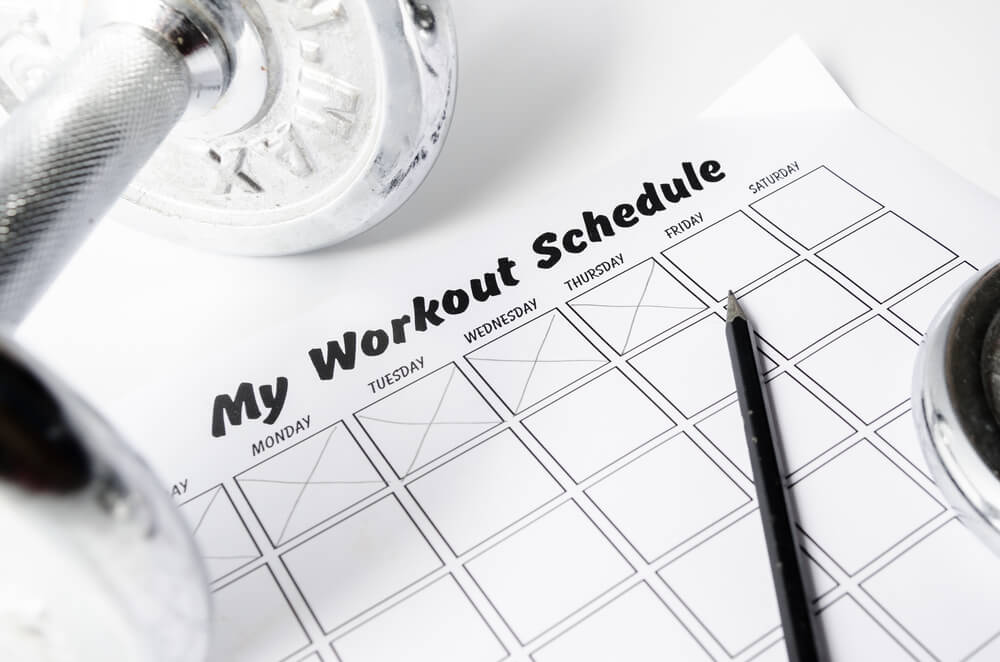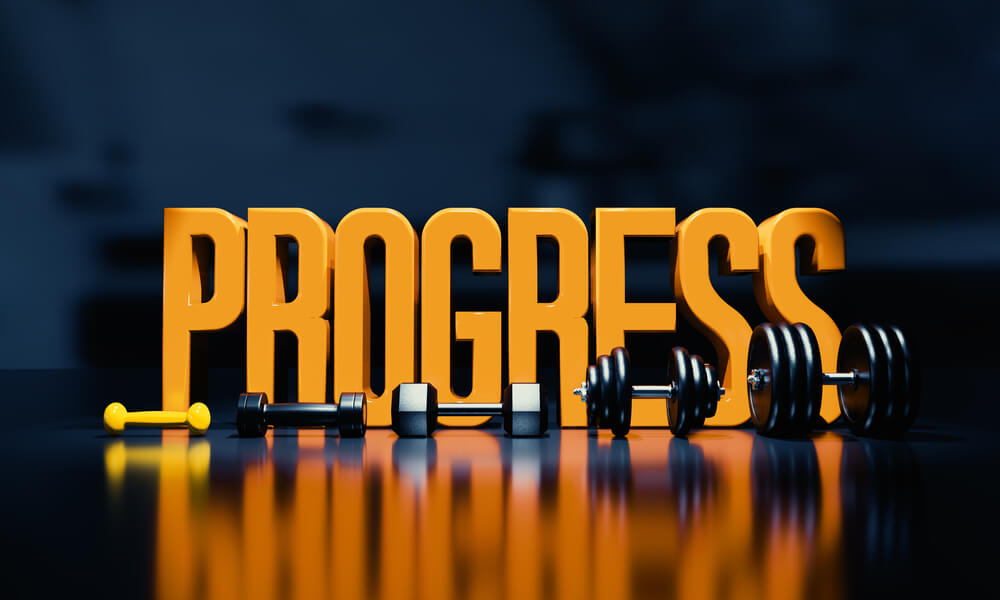
Some of the most popular questions we receive are all generally in the same category – what kind of workout should I do? What kind of exercises? How many reps? What areas should I focus on?
Unfortunately, it’s pretty tough to come up with the perfect response to these questions. Having a balanced workout plan depends on a few different things, like the person’s age, free time, diet, biology, etc. And in the few minutes it takes to response to an email, we simply just can’t cover it all. It’s all too much and too in depth.
While we can provide some suggestions for exercises and plans, there is only one perfect who truly knows what you need. And that person is you.
Designing a workout plan for yourself can be a little intimidating. But don’t worry – we’re here to make it easier, as we’re going to break down each step for you. And once you get the general gist of it, you might find that you enjoy it. In fact, you might find it pretty fun. It can be motivational and exciting to know that the workout schedule you’re coming up with is for you and you alone.
But first ask yourself a question – whatever you’re doing now, whether there’s a heavy focus on cardio or you’re in a calorie deficit, is it giving you the results you want?
Do you feel healthier?
Is it a safe choice?
If you’ve answered yes, then you’re good to go.
You’ve already tackled the toughest part – figuring out what workout plan works for you and putting it to good use.
But if you’re just getting your feet wet, and you feel like you need a change, or you’re ready to dabble in a new area, then we want to share some info with you. It’s always a good thing to fully comprehend what exactly is involved with a good workout plan in order to create your own.
Ready? Let’s go.
Take a good look…
At what? Your life. Your situation. Your free time. Ask yourself how much time you’re able to commit to exercising. If you work from home, don’t have much going on, or have a flexible schedule, and can fit in an hour a day, that’s great.
On the other hand, if you’re married with a bunch of kids and working two jobs to keep things going, and you can only commit to 30 minutes possibly every second day, that works too.
Where Do I Start To Create My
Workout Plan?
No matter what your time availability is, coming up with the most effective, successful gym workouts is critical. After all, you wouldn’t want to waste 3 hours in the gym when you could get just as good of a workout in within a 30-minute window, right?
Ask yourself where you plan to do these exercises. Is it going to be in a gym? Or are you going to use those weights you have at home? Are you going to focus on body weight exercises, or other areas too?
Answering all of these questions is going to put you in the right mindset to figure out what will work for you.
And for the question everyone was waiting for – what kind of exercises should you do?
Well, we’re going to tell you – make sure you keep it simple.
Unless you’re a bodybuilder and you’ve been lifting weights your entire life, we’re going to suggest that you focus on doing a full body regimen. And you want to aim to do this either 2 or 3 times on a weekly basis. Your workout plan needs to incorporate a few different things. You want an exercise for a couple specific areas, such as your butt and hamstrings (the back part of your legs), your pull muscles, your core, your push muscles and your quads (which are in the front of your legs).
Now that’s what we’re talking about – your brand spanking new workout plan is going to target your entire body but it is only going to be made up of 4 to 5 different exercises.

And we’re going to tell you what kinds of exercises cover these key spots.
First, for your quads.This includes things like lunges, squats, box jumps and one-legged squats. If you’ve done any of these exercises before, you know how tense they are on your quads. And that’s why you’re going to do them a couple times a week.
For your butt and hamstrings, this is going to be things like good mornings, hip raises, deadlifts, step ups and straight leg deadlifts.Obviously, deadlifts are a great workout for this targeted area.
When we say your ‘push muscles’, we’re talking about your triceps, your shoulders, and your chest. So exercises that are going to help with this are a lot of presses mixed with a couple of other things, including bench press, overhead press, push-ups, dips and incline dumbbell press.
On the other hand, when we refer to your ‘pull muscles’, the areas we’re talking about are your forearms, back, and biceps. If you think about it, it makes sense. You use these muscles when you need to pull something, and you use the other muscles when you’re going to push something. To target this area, do exercises like dumbbell rows, chin ups, inverse body weight rows and pull ups.
Finally, your core. One of the biggest parts of your workout plan.Your core is made up of your abs and your lower back. So the exercises you will want to do for this area include mountain climbers, planks, hanging leg raises, exercise ball crunches, and jumping knee tucks.
Now, To Make Your A La Carte Workout Plan…
You want to look at each one of the categories above – quads, butt and hamstrings, push muscles, pull muscles, and core –and pick one from each group. Then add it into your workout plan.
Doing this is going to work just about every muscle you have in your body.
Keep in mind we’ve only listed a few ideas for what types of exercises you can do – there are a ton more. However, like we said in the beginning, you want to keep it fairly simple. So don’t get much more complicated than this.
You also want to mix it up sometimes. Think about it – doing the same regimen, 3 times a week, going for months and months and months, you aren’t the only one that’s going to get bored with this. Odds are, your muscles will too. And you may plateau and/or stop seeing the results. So mixing it up and adding some variety is key.
Let’s say your Monday is spent doing bench presses. Well, when you go to do your workout on Wednesday, switch to shoulder presses. And when you get back to it on Friday, go for the dips. Or if you go with squats on Monday, add some lunges into your Wednesday and then box jumps on your Friday.
Keeping things interesting is key, so you want to pick a different exercise each time you do it, to keep yourself (and your muscles) interested.
They’re going to get big when you are resting. So it’s important to give your muscles the rest they need. In between workouts, give yourself and your muscles around 48 to 72 hours to fully recover from these killer exercises.
That’s why we suggested the Monday, Wednesday, Friday routine. It gives you enough time to get in the workouts you need, but it also gives you critical recovery time.
As for how many sets, we’re going to suggest 3 to 5 sets for every exercise. And keep in mind, this number does not include a warm-up.
So your total amount of sets for all the exercises needs to be within the 15 to 25 set range. A good way to get your feet wet is 5 to 6 exercises of around 4 sets each. If you do more than 25 sets during a workout, you may burn yourself out, or you could possibly not be pushing it enough.
How Do I Construct My Workout Plan…
Your next question is likely how many repetitions should you do. This depends on what your goal is. If you want to burn fat while also building up your muscle, then that’s when you keep your reps for every set around 8 to 15. Now, if you’re able to do more than 15 without losing your breath, then it’s likely the exercise is too easy. Either add extra weight or change it up to make it more difficult and therefore, more successful.
On the other hand, if you want to focus on building both strength and size, then you want to change and mix up your rep range. And you can make this easy by changing it depending on the day.
So Monday can be the day you focus on heavier weights with lower reps, in the 5 to 8 range. Wednesday can be the day you focus on lower weights but with higher reps, in the 12 to 15 range. And then on Friday, you can use medium weights with a medium rep range, like 8 to 12.
In order to keep your muscles interested and unsure, you want to force them to get used to the various routines, in order to get them to work harder and faster.
So why does the different number in the reps matter?
When you focus on reps between 1 to 5, this is called myofibrillar hypertrophy, and it’s used to build really thick muscles and boost your strength. When you boost it up to 6 to 12, it’s going to give you the same amount of endurance and strength for your muscles. And when you shoot up to 12 or more, then this is called sarcoplasmic hypertrophy, and that’s when you’re going to build both size and endurance.

With all the different rep ranges you’re going to do, at various increments, you’re going to find yourself building round, even muscles.
And along with this comes the resting periods we talked about earlier. It’s important to rest between sets, depending on how many reps you’re doing. If you’re doing 1 to 3, then you want to take it easy and chill for 3-5 minutes. If you’re doing in between 4 and 7, then go for 2 -3 minutes of rest. 8 to 12, aim for 1 to 2 minutes of rest. And anything over 13, you want to rest for a minute.
Keep in mind that if you’re changing your rep ranges you need to change your rest time too.
In terms of how much you should be lifting, that’ll depend on how in shape you are.
. However, you want to make sure you don’t have a ton of energy left at the end of it. And of course, the way to get there is to try and experiment with different stamina.
When it comes to how long you should be exercising, you want to aim for 45 minutes to an hour. And if you’re sticking with 15 to 25 sets, then you should be able to get done within a 45-minute window. Add in some stretching and a 5-10 min warm up and you might be going for longer than this. Your focus should be less time spent doing it, but more intense exercises so you see better results.
Conclusion
And we’ll leave you with a final critical piece of advice – write down everything. Just like when you were a kid, you want to have a journal. But this one is going to be dedicated for your workout plan. Over time, you want to see yourself getting bigger, stronger and leaner. Keep track of how much weight you can lift, how many squats you can do, etc. This way, you will be able to look back and see how much you’ve grown.
-Terry Asher
Terry
Latest posts by Terry (see all)
- How Important Are Net Carbs For Building Huge Muscle? - Apr 28, 2017
- The Matt Damon Workout Explained - Apr 27, 2017
- Watercress – Benefits And The Best Way To Consume It - Apr 26, 2017










